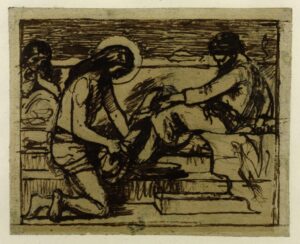
*This is part of our Why We Do What We Do series at Faith Bible Church. At FBC we have elders and deacons who work together to equip and serve the church. We begin to look at the function and roles of elders and deacons in this short series.
As the early church exploded onto the scene, they had a radical love and devotion toward one another. The Scriptures say they had all things in common and were selling their possessions so that the money could be used to care for each other’s needs (Acts 2:42-47). However, as the size of the church grew, so did the needs, and as a result, a conflict arose due to a lack of impartial care for the community. Acts 6:1-7 records what the church leaders did to remedy the situation.
Though the text does not explicitly mention deacons, most theologians refer to the men selected by the elders as the ”prototodiaconate”– or prototype deacons — of the first-century church. In 1 Timothy 3, we see Paul address people in two specific roles, which have been given to serve the church: elders and deacons.
GIVEN TO SERVE THE CHURCH
Jesus, the Chief Shepherd who physically served his church, has given the Spirit to empower us to continue in his mission. As disciples of Christ, we are a kingdom of priests, sent to the world as a light that points back to Jesus and his kingdom. Structurally, he chooses for his church to continue to be cared for within two positions/offices: elders and deacons.
This is seen numerous times in Paul’s writings. For example, he lays out the qualifications for selecting elders and deacons in 1 Timothy 3. In Philippians 1:1, he addresses, “To all the saints in Christ Jesus who are at Philippi, with the overseers and deacons”. And we see in Ephesians 4:12-13a that they are given “to equip the saints for the work of ministry, for building up the body of Christ, until we all attain to the unity of the faith and of the knowledge of the Son of God…”
These two offices work in tandem with one another for the sake of a stronger, healthier church. Elders primarily serve the church by leading, and deacons lead the church by serving. When the church is functioning in this capacity, the result tends to be that all the community’s needs are being met and the gospel can advance to reach those outside the household of faith.
WHAT’S THE DIFFERENCE?
Only one important qualification distinguishes elders from deacons: elders must be “able to teach” (1 Tim 3:2) and “able to… refute those who contradict [sound doctrine]” (Titus 1:9). There is no such requirement for deacons; they “must keep hold of the deep truths of the faith with a clear conscience” (1 Tim 3:9).
Elders, then, are charged primarily with the church’s theological, doctrinal, and spiritual leadership, focusing mainly on the faithful teaching of Scripture. Deacons are charged with the church’s practical leadership under the elders’ oversight. Again, this parallels the division of labor in Acts 6: the Apostles devoting themselves to “prayer and the ministry of the Word” and entrusting the seven with the daily ministry to widows.
In part two of our elders and deacons series, we’ll examine the biblical roles of elder and deacon in more detail.
